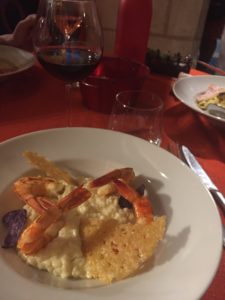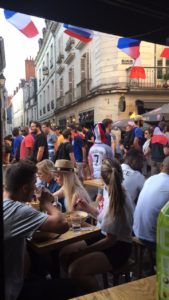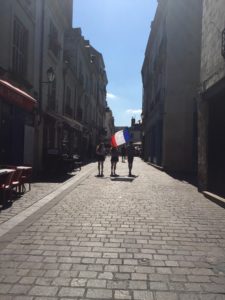A Review of my second week in tours, france
« On est champion ! » // “We are the champions!” – the French people of Tours // Freddy Mercury

Another very warm week has come and gone in France and what have I learned?

- Abbreviations and fillers : So, uhh, English isn’t the only language with words that don’t mean anything and shortcuts, ya’ know. For example, j’suis (meaning “I’m,” pronounced shwee), j’sais pas (meaning “I dunno,” pronounced shay pah), ben… (meaning “well…,” pronounced bah) typically said at the beginning of a statement to get your words rolling and you can throw a quoi (meaning “what,” pronounced kwah) at the end of a sentence for emphasis, although it has literally no significance to the context… While all these all may be commonly spoken, grammatically they are most definitely incorrect and I won’t put them in a French paper at the risk of a bad grade. However, once you know the basics of the language and enough vocabulary to stay afloat in an inundation of French words and cultural references, it’s the ability to add these into a conversation that makes it seem like you really know what you’re talking about. I’ve been trying out this nuanced communication method at the vending machines with my morning coffee: “Bof ! J’suis trop fatiguée, moi !” ( meaning “I’m so tired”, pronounced bowf shwee troh faahteegay mwah). If my accent didn’t give me away and maybe I wore stripes and a beret and carried a baguette*, I’d like to think people would believe I was French.
*side note: French people don’t actually wear stripes or berets on a daily basis, but I have seen more than a few carrying baguettes through the streets*
- Anglicisms : OK, c’est super cool, ça ! The French and English have a history in trading with each other, especially with regard to language. From what I’ve been hearing in conversations, it’s fairly commonplace to have at least 5 English words every 30 seconds (this is a rough estimation, I haven’t recorded any actual data). While the intent is to complement the language with words that don’t quite translate into French and adopting them with the lovely French accent, this “slang” that the younger generations like to use is not always appreciated by their elders. I’ve talked to professors and other adults who are completely opposed to these shortcuts which are, in their opinions, invading the French language. I’ve even seen advertisements that promote the protection of the French language as one of the purest symbols of the French culture. From this point of view, every English phrase absorbed by the French culture should be immediately replaced by a French equivalent. Others like my host mom, Chantal, really don’t mind these anglicisms. For her, it’s a question of having known a good amount of English already and the frequent usage is really more in the language of “les jeunes” (young people). So it’s just as critical for her in the context of intergenerational communication with her son or her neighbors, for instance. However, at the end of our discussion on this topic she finished by saying, “really though, some words you just don’t need English for.” This was, of course, stated in French. The bottomline is anglicisms aren’t always appreciated, but they are used in just about every conversation.
- Formal letters and basic anatomy, a lesson on cultural context : As I’m approaching the date of my DELF B2 proficiency exam, I’ve been spending a significant amount of time learning the organization of several types of common French documents like formal letters, the essay, commentaries, blog posts, and letters to the editor. These common, written means of communication, which I normally don’t think twice about, have been my main focus. At first I thought, sure, I shouldn’t have any trouble writing a letter to a mayor or director of a company and maintaining an opinion, but as I went through the review, I realized that the French culture had its own particular way of presenting this kind of information. The level of formality is especially accentuated by the use of vous, the formal “you”, which is at the base of such correspondences. Practicing this skill of writing a letter in and of itself isn’t terribly difficult, but it took some work for my mind to readjust and accept this different representation of something that was familiar to me in the context of my own culture. Similarly with learning basic anatomy and the run-down of a general medical consultation in French, I feel as if I’m starting again at square one. In this case, the medical field in French is shaped not only by a different vocabulary, but also a different healthcare system than what I’m accustomed to. While I’m essentially just learning a new vocabulary that allows me to communicate via a written statement or in a medical setting, the lessons go beyond that. If I truly want to understand the words I’m saying, I have to understand the culture that they stemmed from and then I can apply them in a letter about the importance of les pauses (breaktime) in France or in an exchange with a patient to determine the cause of her mal au foie (liver pain).

- The food is phenomenal and Tours is a walking city : Good thing, too. I think I’ve eaten my weight in baguettes and cheese sinceI’ve arrived. Well, maybe not that much, but I’ve definitely been appreciating la nourriture française. Fun fact: French gastronomy is recognized as a symbol of cultural heritage in France and I can attest to that. While I love a good meal loaded with carbs and butter, getting some exercise is not a bad idea. Moderation and balance are key! Given that I am struggling to figure out the summer hours of the public transportation schedule, I take at least two 30 minute walks everyday. The apartment I’m in is located in the part of the city closer to the Cher river on the south side of town while the institute where I take classes is in the center of Tours and nearer to the Loire river. It’s a scenic walk especially if walk through the park (Jardin des Prébendes d’Oé), so I don’t mind getting my steps in this way. Apparently, Tours has become more and more of a town focused on non-car transportation. According to the locals, the city removed the parking spaces in the middle of town a few years ago to install a tramway. Also, I’ve seen lots of purple rental bikes called “indigo weels” which are reminiscent of the many “lime bikes” I’ve seen around South Bend. Anyways,

Les fleurs du trottoir // sidewalk flowers there are a good number of individuals who don’t depend on gasoline to get to their destinations whether that’s school, work, or a marketplace where shoppers usually tote a wheeled grocery caddy behind themselves to make hauling groceries easier. Coming full circle back to the food, I’ve noticed that the French will go to grocery stores and markets more frequently than us Americans. They tend to purchase less given that they take multiple trips throughout the week whereas we, or at least my family and I, purchase groceries like we are preparing for Armageddon. Maybe it’s because the stores are relatively closer to people’s homes in the more densely packed French cities making it more convenient to get to a grocery store, or maybe more of a priority is given to fresh food preparation? Whatever the cause is, this is a cultural difference I’m beginning to notice.

- Patriotism and football : This past week, especially the weekend, was filled with bleu, blanc et rouge (blue, white and red… it feels strange reversing the red and the blue) for the colors of France. It really has been an extended celebration of this country starting with the first stages of the Tour de France, continuing on with Bastille Day (la Fête Nationale), and wrapping up with the final game of the Soccer World Cup where France beat Croatia 4-2. The Tour de France is an iconic race between cyclists from around the world to bike about 3,500 km/2,200 mi around the country it’s named for. This began Saturday, July 7th, and exactly one week later, July 14th, France celebrated its unification around the revolution during 1790. I had the chance to see the fireworks which were displayed over the Loire river near one of the favorite, local hangouts, the Guinguette. My friends and I stayed on the upper part of the pathway along the river’s edge for a better view above the trees and because there were so many people in the lower part that you couldn’t see the ground! But if I thought there were a lot of people for le 14 Juillet, there were even more for the final game of the World Cup on Sunday. I went to another preferred meet-up spot of the Tourangeaux (people of

Allons enfants de la Patrie, le jour de gloire est arrivé ! Tours), Place Plumereau, where the streets were filled with spectators draped in flags and covered in face paint hoping to catch a glimpse of the game on one of the TVs of the many cafés on what was arguably the hottest day of the summer. When France scored a goal, the crowds erupted with cheering, jumping, and singing of the national anthem, the Marseillaise. When France won, this energy was amplified one hundred times. The songs and general sense of fraternity went on for hours; drivers honked there horns and shouts of “on est champion” rang out till the early hours of the morning. Apparently, this victory is supposed to raise the presidential approval rating of President Macron by at least 8% and one of the most remarkable statements I heard after the game was that no other event has had the same efficiency in bringing the French together on the streets since the end of World War II. There’s nothing like a good soccer game to unite an entire country.

Well, that’s all for now! I’ll keep working on my listening comprehension, speaking and writing abilities to get to the goals I’ve set for myself, but I was so glad I got to be present for such a culturally significant week in France.
À plus tard ! // See you later!